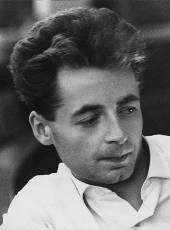

Peter Ronnefeld
Nachtausgabe
Short instrumentation: 1 1 1 1 - 1 2 1 0 - timp, perc(2), pno, str (soloistic)
Bearbeitet von: Ernst Märzendorfer
Text von: Peter Ronnefeld
Text bearbeitet von: Richard Bletschacher
Roles:
Emma Bachofen
room renter ... bass
Anna Pachulke
her friend ... soprano
Renée Pachulke
her daughter ... high soprano
Lothar Witzlaff
student and poet ... baritone
Mario Caraccini
student and painter ... tenor
Ping Schma Fu
student und photographer ... tenor
Dr. Erich Stielicke
chief editor of the ‘Nachtausgabe’ ... tenor
Karin Mikoleit
his secretary ... mezzo-soprano
Sternhagel
a sergeant ... baritone
Stramm
a commissioner ... baritone
four juvenile newspeople:
1) Frauke ... soprano
2) Wibke ... soprano
3) Heike ... mezzosoprano
4) Hauke ... tenor
Instrumentation details:
flute (+picc)
oboe (+c.a)
clarinet in Bb (+bass cl)
bassoon
horn in F
1st trumpet in C
2nd trumpet
tenor trombone
timpani
1st percussion
2nd percussion
piano
1st violin
2nd violin
viola
violoncello
double bass
Ronnefeld - Nachtausgabe
Sample pages
Audio preview
Work introduction
Peter Ronnefeld was only 20 when he composed his chamber opera Nachtausgabe [Night Edition] – opera piccola in 5 scenes (1955-56). It was not his first work for the stage, but earlier ones only survive as fragments. Ronnefeld was already teaching at the time at the Mozarteum in Salzburg; he wrote Nachtausgabe mainly for his students’ study purposes at the International Summer Academy. Although it is a modern opera buffa, its subject is timeless – it is about sensational stories, gossip and tittle-tattle in the tabloid press, the persons involved and scandal-sheet readers.
Ronnefeld brought is great musical and linguistic talents to bear in a manner reminiscent of his own personality - shrewd, impudent, ironically jocular. In conversation, his contemporaries all mention Ronnefeld’s sparkling sense of humour, obviously not forgotten; even Thomas Bernhard (who had a speaking role at the premiere performance) said afterward that he had never laughed so much as he did during the time he spent with Peter Ronnefeld, one of his best friends. [1]
Boris Blacher, Ronnefeld’s teacher, was the musical influence; Ronnefeld esteemed him highly, and his stimulus is plainly evident. The freely tonal composition bristles with brilliant ideas, for example the moment when the reporter, a singer on the telephone, receives the replies to his words from the orchestra in a sonic jumble of voices – punch lines are often triggered by the instruments in the ensemble instead of human voices. Ernst Märzendorfer reworked the piece in 1987, leaving the opera’s essentials untouched but carefully “smoothing it over.” For instance, a secretary now has a mezzo part, Bernhard’s speaking role at the premiere is now sung and the music regrouped in some places. The press was uniformly enthralled at the premiere when the new version was given in 1987 (on the studio stage of the Vienna State Opera in the Künstlerhaus); many of the Austrian and German media raised their voices to praise the work and the performers to the skies.
